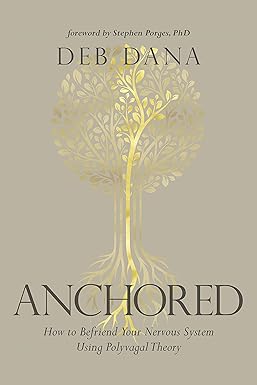Some of the insights I shared last Sunday were adapted from a book by Deb Dana entitled Anchored: How to Befriend Your Nervous System Using Polyvagal Theory. The Lay Pastoral Care Team has had a little exposure to polyvagal theory in their training over the past year, but this is a new concept for a lot of people.
What I love about this particular book is that Dana uses some evocative and clear metaphors for what could be complicated ideas. And she invited practices throughout the book that make it experiential rather than just informative. I get to feel what she’s describing in my own body instead of just reading about a theoretical, abstract human experience.
Some of those experiences are like the 20–30 seconds we took in worship to tune into a cue of safety and connection. Some are a little more involved. But they are all designed to help a person become more aware of experiences where we feel anchored. Another phrase for that is feeling at home. Or we might say centered and grounded.
We don’t stay in that space. There are times when I don’t feel completely safe or anchored. I would probably be a bit detached from reality if nothing ever affected my sense of being at home. But if I don’t know what “home” feels like, it’s not so easy to get back to that feeling of being centered and grounded. Anchored.
The end of the year is full of experiences that tend to knock us off balance. There are holidays that bring all kinds of expectations, some of which feel like obligations. There may be family members we feel required to visit, even though we don’t necessarily enjoy spending time with them. We may feel pressure to spend more money than we have or want to, or to fit more things into our calendar than we’re able to fully enjoy or appreciate. And a lot of us may feel pressure to be happy and joyful and completely free of unpleasant emotions during a time of year when it’s least reasonable for us to be completely free of unpleasant emotions.
During a time when Nature is sending all sorts of signals to slow down, breathe, and rest, we also receive a lot of competing signals to do the exact opposite. It might even feel defiant to follow the invitation of the season to be still, nurture our spirits, take a little more time connecting within ourselves.
Knowing what home feels like—recognizing an embodied experience of safety and connection—can help us find our way back to that feeling of being anchored when we’re thrown out of balance. It probably isn’t reasonable to stay blissfully detached from anything that might threaten our sense of peace. But maybe we can strive to stay connected enough to ourselves, the world, the divine, and other people that we maintain our balance a little more often. And we don’t wind up staying stuck in protection mode all the time.
May this season be a time of connection for you, may you have abundant opportunities to recognize the feeling of being centered and grounded, and may you trust your ability to find the way back to a state of being at home. Anchored.
Share this post:
